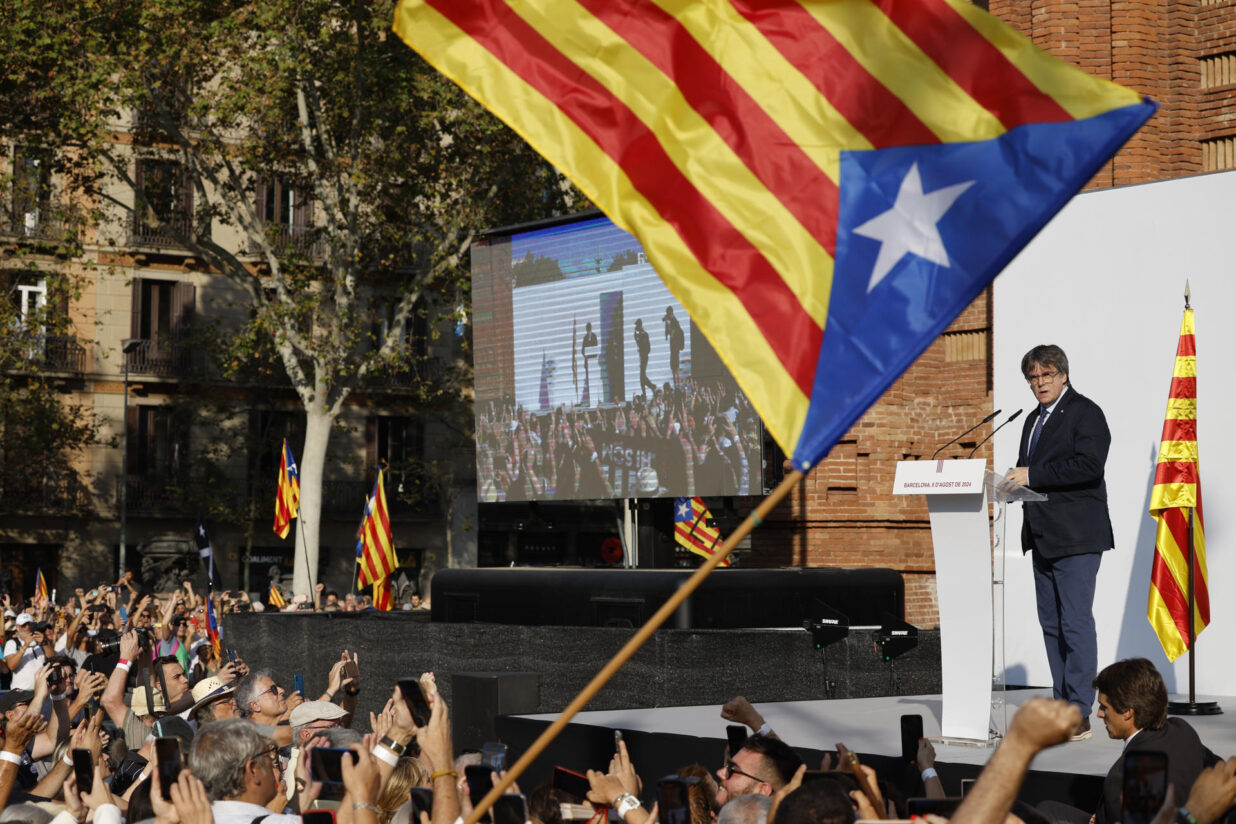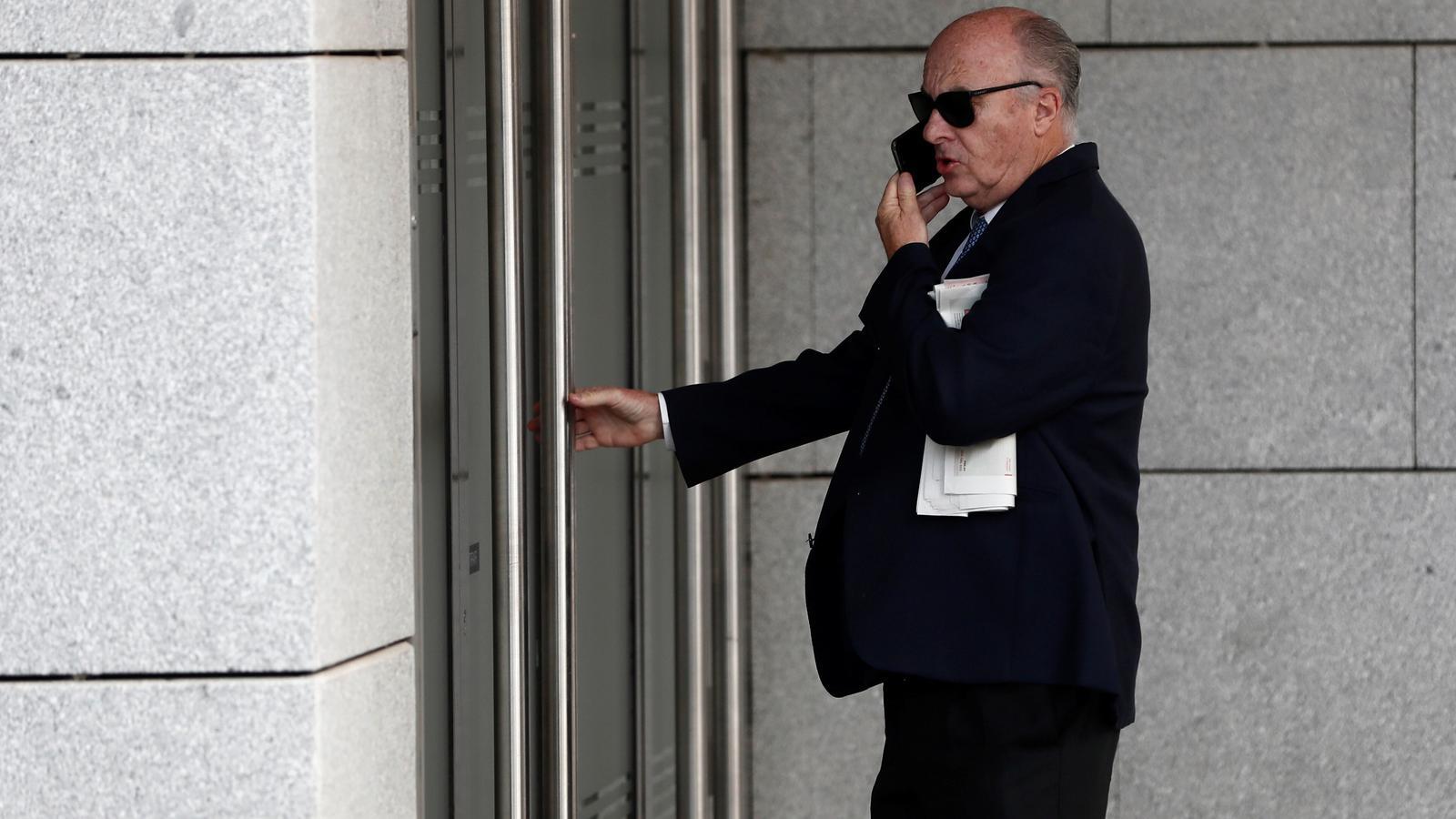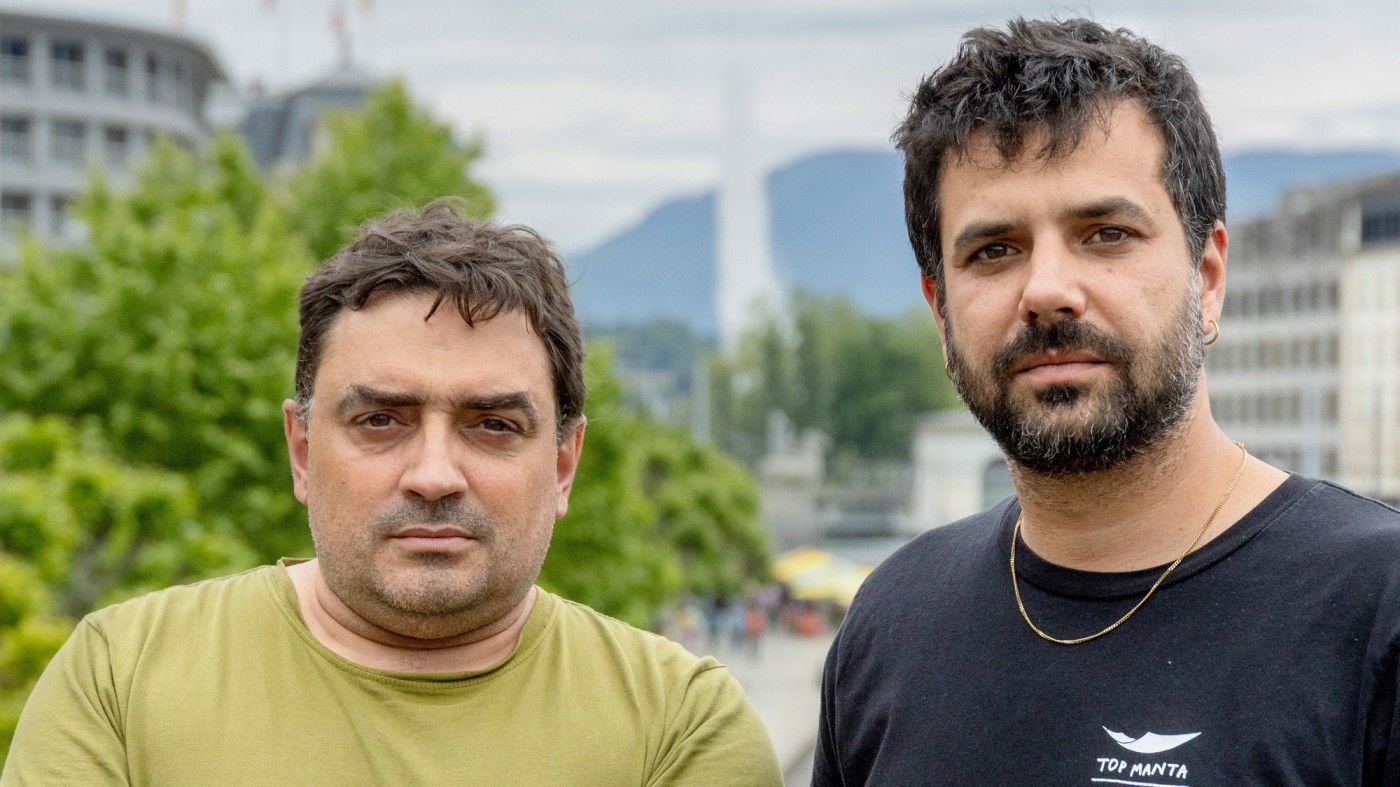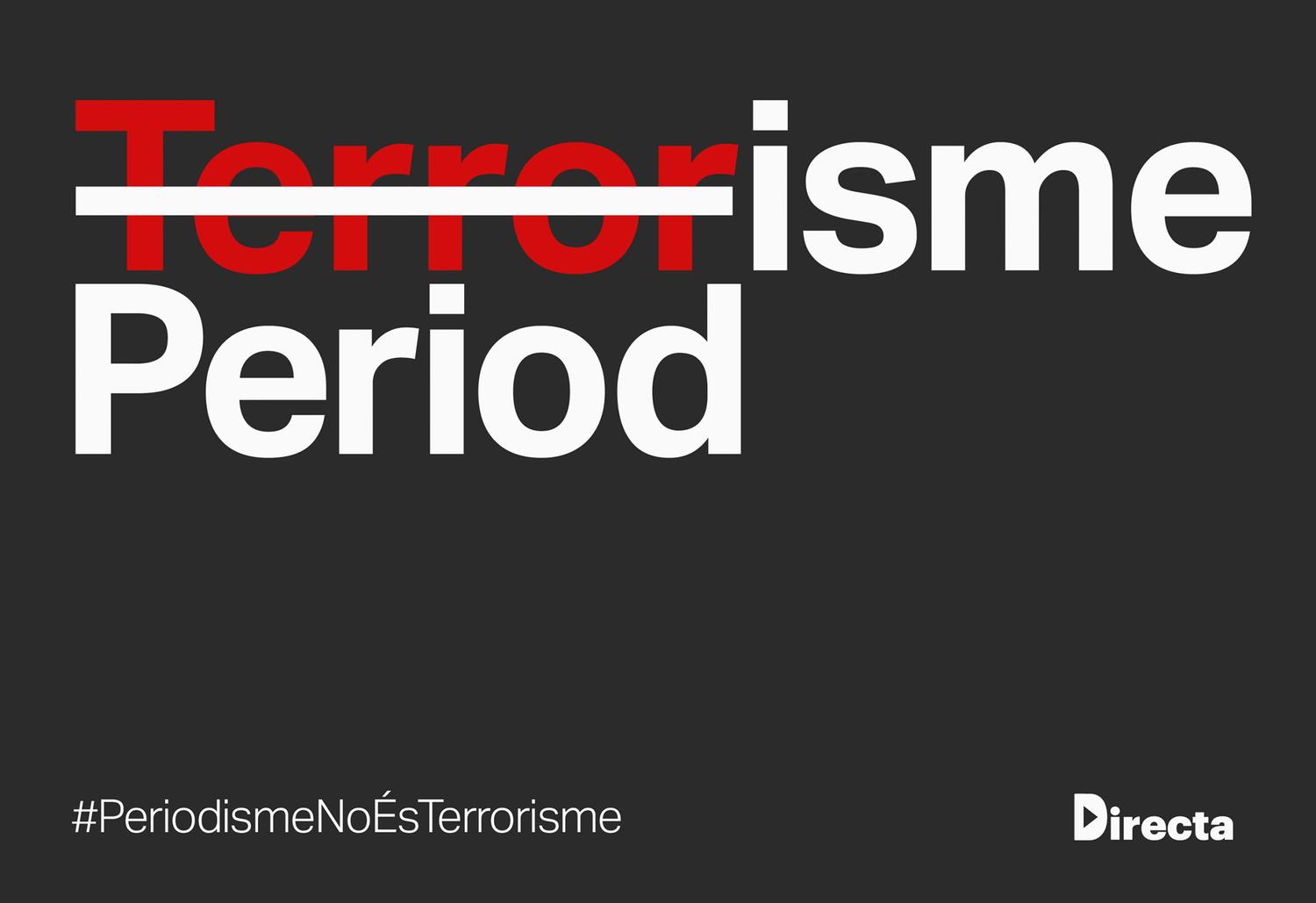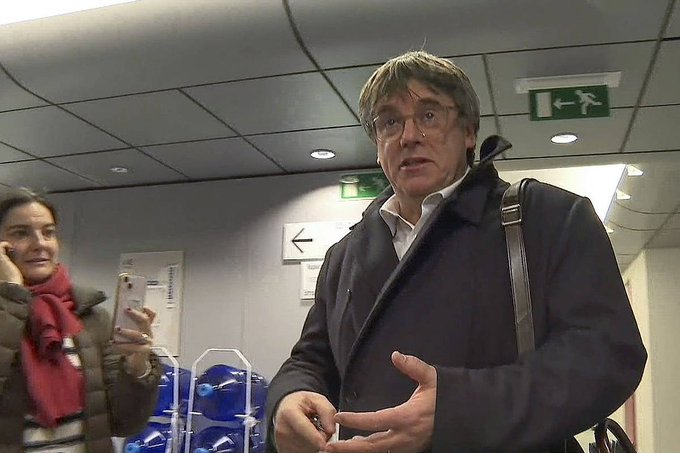"At the right time, the Mossos will not act against the people of Catalonia"
- Few politicians have received so many applause and insults in such a short time. You will not find the hair in the mouth of this Catalan outsider who, in exceptional times, has shaken Spanish politics. Gabriel Rufián receives us at the headquarters of Esquerra Republicana de Catalunya in Barcelona. Mediaset's cameras await him at the door, while the cops, dressed in paisano, await him. Two days after the interview, the Civil Guard will arrest 12 senior officials of the Generalitat, including several of its supporters, and thousands of people will take to the streets to denounce the first chapter of the coup d'état against Catalonia.
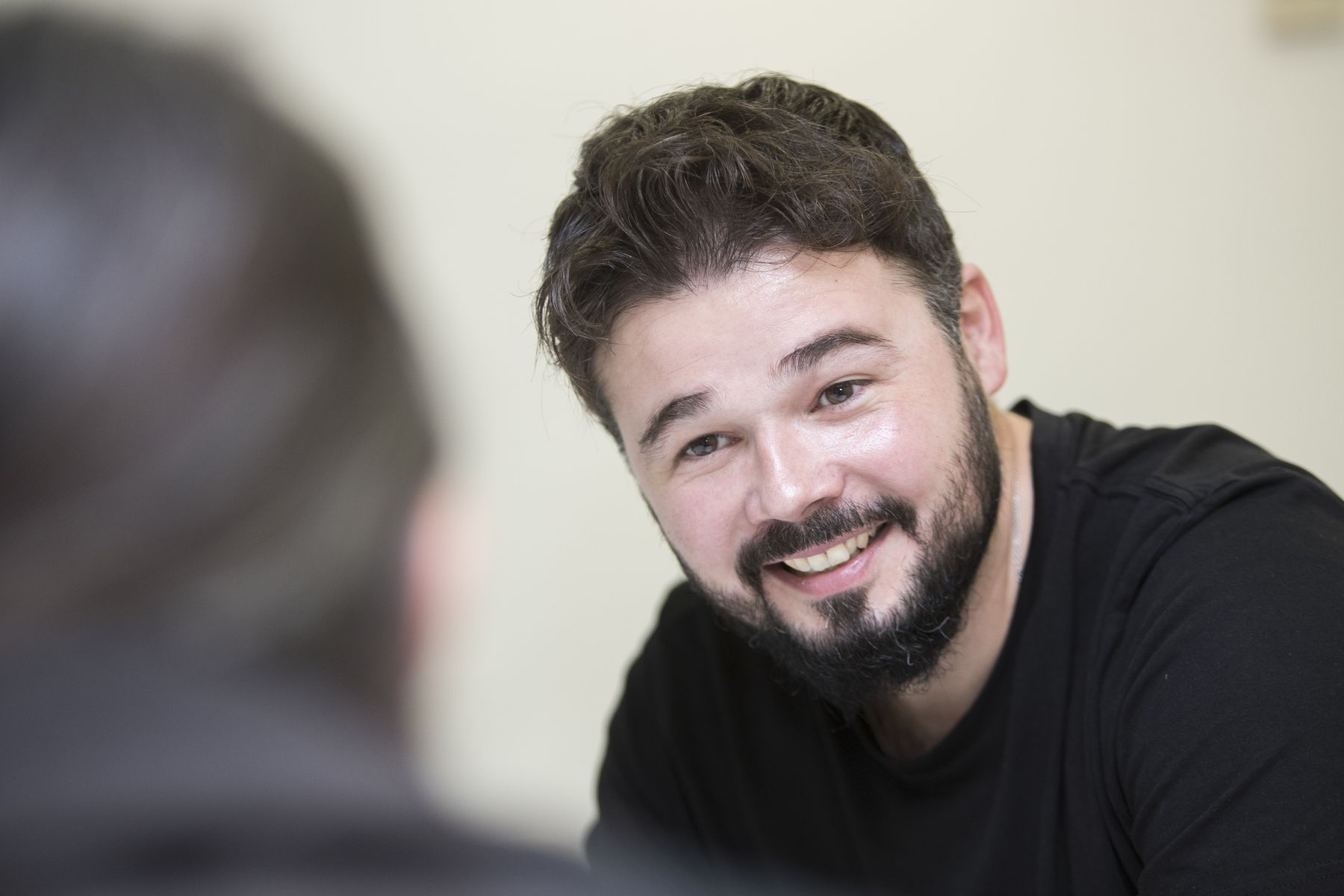
You have a six-year-old son. How does the frenetic march of these times combine with the family?
When we jumped to the front line of politics, the first thing Joan Tardà told me was: “Take great care of the family.” That is what I try to do in the short time I have changed my environment, my place of residence and my relatives. They treat me the same way, to see if mentally I feel very good. But it is true that this is the worst of this work.
How do you take the subject of media pressure?
Depending on the time. There are more complicated moments. Here and in Madrid I have not had any bad experience. The only thing I've received is encouragement and love. Before, we didn't have much social life with my wife and my son, and now we didn't.
In a recent interview, Zapatero said that right-wing nationalism did not foresee independence and that the independentists could not imagine this situation occurring as soon as possible.
These kinds of arguments confirm that a group of people who 10-15 years ago were not pro-independence, are now pro-independence. It is part of the thinness of the media ‘cave’ to talk a lot about Catalan politicians and leaders and very little about what happens on the street. After all, they talk about others so they don't have to talk about themselves.
Many of us have tried to change the Spanish state, but, in the end, we have understood that the state changes through a political process such as Catalan; I would like the other nations of the state to one day follow the same path.
The President of the Generalitat has disseminated the criteria for overcoming the censorship of the Civil Guard on the referendum website. Very crazy things are happening these days, right?
Yes [between laughter]. For some it is a ‘shock’, but here, in exceptional times, coalitions of exception were made and people from very different worlds, such as Carles Puigdemont and Anna Gabriel, are on the same day.
Is “legitimacy vs authority” what we are experiencing?
I think so. The State has only laws at its disposal; one night they changed a Constitution that has been violated for 40 years, such as Articles 47 and 128. However, today, they claim with their raised chest. It's an absolute hypocrisy. Society does not have to adapt to the laws, it is society that has to adapt the laws. Furthermore, legality is one thing and legitimacy is another. 80 years ago, working 8 hours a day, exercising the right to strike or voting universally were illegal.

Along the way I found myself in the street with a sign that said: "Without disobedience, there is no independence."
I feel very comfortable with the word disobedience, but I sincerely believe that it is much more correct to talk about obedience to oneself. That is what the Catalan Parliament has done: to obey itself, to fulfil its promise and not to miss the independence order. The opposition, unlawfully, complained that we were implementing the election programme. I say this in all humility, that is the future of politics. The Catalan Parliament is demonstrating what has to happen next, and it is also doing so in the Congress of Deputies.
The mayors of the Cup have been willing to "disobey" court orders. This decision has caused itching in several environments, as it could provoke a conflict with the Mossos d'Esquadra. Puigdemont
himself, who is in the ideological antipodes of some of us, has said that he is not going to give in to a hypothetical disqualification, because the only one who can put or remove the President is the Catalan people. The same has been said by Oriol Junqueras. It is a great step forward, which many people were made inconceivable.
What the mayors of the CUP and ERC, also of the PDeCAT, and possibly some other party, are going to do is not disobey, but try to fulfill the commitment to their people. Many people who previously proposed not to go to vote or vote no, today will vote and some are analyzing the possibility of the yes, because they have understood that it is not legitimate to persecute a mayor who has been democratically elected in their people.
A letter signed by Oriol junqueras, Ada Colau and Carles Puigdemont, in which it was read that the Government of Spain, Mariano Rajoy and Felipe VI. They tended their hand to the king to resume the conversation.
I do not know very well what the negotiation of the letter was like, but I imagine that the hubo.El Catalan people, through their political representatives, has been sitting at the table for four or five years waiting for someone to stand on the other side. It is necessary to reflect that the Catalan people were at the negotiating table until the last day and that the only answer they received was total repression, oppression and the dispatch of the Spanish Police and Civil Guard. That at the international level, on the field where the next battle is going to be fought, is very important.
Asked on 1 October, some speak of the coup d'état, others say that if there is
a referendum there will be many problems...The truth is that in people or meetings related to the referendum, I have not met anyone who has proposed an alternative plan. On the part of ERC and the Cup, I'm absolutely convinced that there's nothing like that, and on the part of the PDeCAT, I also think not. We have an absolute majority in Parliament, there are thousands and thousands of people on the street and the president, the vice-president and the government are very clear that they are going to make a referendum. How does this stop? Sending the Civil Guard to arrest people? Putting cops in front of the media and printing presses? Hijacking the posters of the referendum? After they've stolen those posters, they're becoming more famous than if they were on the street. It's unstoppable. As Joan Tardá rightly says, history has shown that democracy cannot be stopped, that people on the street are unstoppable. The referendum will be held because there is no other alternative. Political conflicts and political confrontations are resolved at the ballot box.
“The independence of Catalonia is nothing more than an opportunity to change things. Nothing else.”
The National Police and the Civil Guard are not the only agents working in the fight against the independence referendum in Catalonia. In many villages, the Municipal Police and the Mossos d'Esquadra are those who are pursuing or applying censorship. When the
Civil Guard has stood in front of a media, we have not pointed out to them. What is more, we have tried to dignify in Congress the working conditions of the civil guards, which in many cases are very precarious. The responsibility lies with the political class. As far as we are concerned, it would be unwise to point out this or that police officer. But I am convinced that, at the right time, the Mossos d'Esquadra will not act against the Catalan people.
Police have hijacked 100,000 posters for anyone to see on the street, but at the same time they have spread these "illegal" posters on Twitter for everyone to see.
Dramatically, the Spanish Interior Minister, Zoido, writes this kind of tweets, because that's why the elections win. The pp, Citizens, the Constitutional Court, the Prosecutor’s Office and the Aranzadi Media Brigade act in this way because in the Spanish State they win the elections. Here, on the other hand, they are second-division parties, especially the PP.
Even though some politicians we consider to be siblings think otherwise, Rajoy is not in the Moncloa for a weather effect. He wins the election, and he's won more, taking Carme Forcadell to the judges. The elections in Spain won them by taking pictures and videos of banners, as if Pablo Escobar's cocaine were being treated.
Media war is the first trench.
For a few years now, we have been attacked by the media front. In Euskal Herria the Abertzale left has known this for a long time. This is the ‘clay machine’, according to Umberto Eco. When we go to some media we know very well what we're going to do. Lately, I've done hundreds of interviews. “I have no idea,” I have only answered two questions. One is “How are you going to throw the army?” and the other is “How will you take control of airspace?” Honestly, I have no idea, but I am sure it will be peaceful and nothing will happen. But that's been enough to say that I have no idea how to make thousands of videos. Xabier García Albiol wrote a highly successful tweet and, moreover, in the Parliament of Catalonia, Joan Coscubiela called me “a parliamentarian without ideas”. We fully understand what this is all about. We've been crying from home.
“Brunete” is not going to talk about how a state is going to attack a people, they prefer to invest more time in the clothes I have put on or in my tone. But we want to question people who can see us on television or on Youtube with a critical sense. So I cracked my head for a moment. It's slowly getting there. On a personal level, I see a huge difference between the media bubble in Madrid and the situation in Catalonia. It will take a lot of work to change it.
“The dirty war against Catalonia is not a thing of the past, it’s happening now”
The debate and the contradiction have also reached the doors of the media in Catalonia. That is the case with the newspaper Ara, which came about as a result of the decision not to advertise the official referendum.
I think it's the weakest part. For my part, it would not be very fair if I now faced a media outlet, because everyone believes that their editorial line has not responded to what it is. It would not be fair to the workers. In all the media there are dignified people. In all. That is what I have known, especially in Madrid.
What is certain is that if you try to hide what is happening in Catalonia, you will end up losing out. Anyone who tries to cover up what is happening will pay for it by the media as of 2 October.
Now I'm going to go straight into Four and I know you're not going to treat me well. They want to see you angry. A Catalan who is a little right, but who is angry. But when you see that you're able to stumble upon them, or when you tell them that nothing is burning here, it's they who get uncomfortable. Stupid things are said. A guy on the plató of a television in Madrid explains the reality that you are living, it is a little curious.
Let me give you another example. Last Saturday, they interviewed Alberto Garzón in The Sixth Night. For half an hour he referred to the United Left measures to promote employment, which have been rejected. I would love to go to any media to talk about our employment policy, but no, I have to talk about Puyol. It's dramatic to say this, but it is. We know what we're going to.
More and more repression, more solidarity and more mobilization. Is that the equation?
No. I hope there will be no repression, but there will be repression. Judicial violence will continue. Disqualifications. Dirty war. We have seen it in the committee that was set up in Congress to investigate “Operation Catalunya”. The dirty war has not happened, it is happening today and it will continue to happen. The truth is, those who are following us are going to get bored like crazy, because we have very boring lives.
As the process progresses, it is clear that Catalan society has moved to the left.
Their guarantee is manifestations like the CUP. In many cases they have been the motto of this process, in the conscience of many people they have made Kilker the one who speaks. The ERC party is getting bigger and bigger and brings together people of all kinds. This makes it a winning political force. It is my hope that, at some point, something like this will happen to the Basque left in Basque Country.
Another left, We can, says that if Rajoy leaves, everything will change. It is a very tricky speech, because it means convincing the PSOE, Citizens, the Constitutional Court and others. They ask for fraternity. But we think that's another thing, for example, to let anyone who can win win and not to say that you have to wait for the other to win.
The question of the bourgeoisie is why it is bad to agree a process of self-determination with the PDeCAT and, on the contrary, it is good to agree with the PSOE the reform of Spain? For the time being, the answer has been total silence.

In order to facilitate the incorporation of other leftist sectors into the process, would it not be interesting to start defining a hypothetical Catalan republic from today?
It seems that there is therefore no talk, but it is not entirely true. It is mentioned on the street and in political acts. But that possibility is going to come, depending on the outcome, because we will soon have constituent or autonomic elections. Then each one will be able to explain their country project.
On the other hand, the Catalan Parliament, despite the noise it has generated in the area, has certainly approved very important social budgets. The support of the Cup is the guarantee of this. The Cup, however independence it may be, would never accept unless it were the budgets with the greatest social spending in our history.
Do you not think that in recent times the most institutional leg of the process has taken too much prominence?
It was a moment of great epic and a lot of confetti. There was another very political moment, when a budget and a parliamentary majority had to be agreed. It was the time when Artur Mas had to marcharse.Era inevitably move the moment from the street to the institution.
Today, of course, we are living in a very street moment. It may seem from the outside that the institutions have full power, but Catalan politicians in our recent history have been nothing more than an instrument. I mean, if someone came to think of making a trip to the Moncloa to stop all of this, people would pass over. Someone reaching out to Rajoy, can you imagine a picture of this kind? Such situations have hardly been experienced in political life.
The new Statut created a great illusion in many people. The photo of Artur Mas, Lluran i Lleida and Zapatero was the great reflection of that image. And nothing happened. That is unthinkable today.
I understand what you say, but from what I come from the popular platforms ANC and Sumate and from what I've seen from within, I don't see it that way, but maybe you're right.
“We have before us a Spanish left that comes from the struggle and disobedience, very dignified and courageous, but that does not understand anything about Catalonia”
David Bonvehí, a highly responsible PDeCAT member, said three weeks ago that the strategy will change if the results of the referendum on 1 October are bad.
This question is for them. However, we should be a bit benevolent with the PDeCAT. They come from where they come from and represent the parliamentary and social area that is essential to this process. They talk to their people. I think that a certain pragmatism is part of their DNA. But what I know, and I say this frankly, is that the principles are absolutely committed to the process. They're ideologically in my antipodes, but they're totally compromised. I'm staying with that.
Taking a leap towards another type of compromise, the lehendakari of the CAV has also been very clear.
Within the PNV there is a part that is totally favorable to the self-determination of the Basque Country. I respect that part, but the pp approves the budgets thanks to the PNV. The statements of Iñigo Urkullu should be understood on the basis of that key. What I do not understand is why some believe that the PNV has assurances that the referendum must undermine our process. The PNV is currently almost entirely an autonomous party. He has his own interests in Congress and is a preferential partner for pp. Part of it is logical. On the one hand, because it is not the first time it has done so, and on the other, and above all, because the PNV is a right-wing party.
Gerardo Pisarello, from Barcelona in Comú, says “let’s move and vote against centralist authoritarianism” and Pablo Iglesias, from Podemos “we need help to bring down the PP”. There's a little bit of a difference, right?
We try to distinguish between leadership and people who have voted, militants, sympathizers and trusted them. But there are several leaders in Podemos, Catalunya Yes it is Pot, Barcelona in Comú and Catalunya in Comú that, in short, say the following conclusion: “Now it doesn’t work for me.”
It is dramatic, because fraternity should be emphasised among us. We have defended an absolutely impossible motion of censal in Spain, for democratic respect and dignity. On the contrary, they wanted to cover two heads with a single txapela.
It is to be welcomed the courage shown by some of the most important ones, from the first minute, such as Jaume Asens, Albano Dante or Marta Sibina. In circles and assemblies it is people who have defended and defended at all costs their ability to break the referendum and the 78 regime. On the contrary, the approach of others is, although legitimate, to become positions in a project that will be agreed with the PSOE in the future. And now it seems to him to be incompatible with his being in favour of the referendum. But fortunately, the opinion of the members and the militants has prevailed. We are sure that they will be actively involved.
“In people or meetings related to the referendum I have not met anyone who has proposed an alternative plan”
Have you seen the face-to-face between Manuel Monereo (Podemos) and Pau Llonch (CUP)?
Yes. In fact, I talked to Monereo in Congress.
Monere said that everyone knows that there will be no referendum. The Pau Llonch of the CUP replied: “The Spanish left is in favour of the right of self-determination, provided that it is never exercised.” The
truth is categorical. I have a very good relationship with Pau. I think it's one of the best heads on the left today. I would like to see it once, for example, in a parliament. This interesting debate showed that we are facing a very dignified and courageous Spanish left, represented by Monere, which comes from struggle and disobedience, but which does not understand anything. It is being shown that they have complete myopia in the face of Catalonia. Their message is somehow reduced to saying that the Catalans are angry Spaniards. If they put themselves in power, everything is solved, because the problem is that Rajoy is the president. But the problem goes much further. We are very clear that all of this is also done for Spain. The only possibility of democratizing the Spanish State is through the self-determination of Catalonia.
If the Cup had surrendered and the current president had been Artur Mas, do you think all this would be possible?
I remember at the time I said something that caused some tension between some of the Cup's friends: “Without what Mas represents, we will not.” By that I mean that there are many forms of independence, that people have come here on very different paths: economic, identity, ideological – that is my case – partisan, etc. And there's a kind of independence that is presidential, the ‘massaging’. With a state against us and with a clear majority after the plebiscite elections, there is not enough nadie.Algunos feared – I was one of them – that if we lost some symbols, whether we liked it or not, we could lose some representation, history has shown that this presidential independence has been assumed today by Puigdemont. Other kinds of people get into this as they do for Junqueras. My case is very different.
Science is about making political fiction, but it's true that it brought about a change in the PDeCAT, and maybe without that, the faces and the new leaders would come later. However, let us not forget that, even if he is not the president of the Generalitat, there is Artur Mas. He continues to represent the people who are in this, the mass.
Banco Santander, BBVA, La Caixa, Sabadell and Popular signed a statement two years ago in which they stated that, if unilateral independence is declared, they will leave Catalonia a.En first, this belies the mantra
that says that this process is led by the Catalan bourgeoisie. If that were the case, this question would not be raised and, furthermore, we would already be independent. Secondly, these people have no ideology. It may have something, but the pattern is money. He directs radical pragmatisms. Even though they like it more or less, Catalonia is a strong economy, an economic engine of the Spanish State. So the only thing these people want is not to miss a dollar.

On the contrary, in the case of Scotland, the factual forces were not so aggressive. Maybe because there was a capitalist force in power?
I am a Marxist. We are not anti-system, the system is what is against us. I believe that everything needs to be changed, and this neoliberal model too.
A few months ago, the management of the Generalitat Economic Council seemed like a Holy Grail, which was only in the hands of a few. But then it was the ERC that assumed, Oriol junqueras, like vicepresidente.Las exports go almost like never external investment and GDP doubles state and European growth. Anyone who believes that in Catalonia, from one day to the next, the streets are going to be on fire and everything is going to change, is very wrong.
Let us not forget that the Spanish state owes 114% of GDP. If the 'yes' win, the next day the Spanish State will have more interest in having things go well to Catalonia. We will open a process of negotiating everything, including assets and liabilities. I therefore do not believe that there is any problem, even though I belong to a sector that is critical of the world of finance.
What can come from the European Union of Merkel, Macron and company?
Europe does not exist, it is the banks. The European Union is miserable and miserable, you can only see pictures of the border between the Mediterranean and Macedonia and Greece. But they're also pragmatic. I find it very difficult to imagine a situation in which the EU throws Catalonia or refuses to achieve a democratic result. They are the same ones that have not allowed Hungary or Greece to leave the EU.
We are aware that interest in what is happening in Catalonia is increasing even in these centres of power. After Carme Forcadell's statement in court, I spoke to the representative of the Generalitat in London and he told me that he then had the opportunity to enter Westminster for the first time and talk to parliamentarians. This judicial and institutional offensive of the State has come to the conclusion that people who previously had no curiosity about Catalonia are beginning to show interest. The statement by Jean-Claude Juncker or the letter by the Danish parliamentarians demonstrate this. Several members of the political forces of the Brussels Parliament have told us that this is a matter of concern and is more on the agenda than a year ago. And all of this has occurred, above all, because of the democratic deficit that the Spanish State is showing.
Ageing Western reactionary societies are in themselves opposed to any change. Every process of independence alters the daily life of citizens, in a more or less harsh way. Is a painless process not often being sold?
You're absolutely right. In Scotland, 70% of young people voted for independence. The referendum was lost out of fear of the majority of the population, according to the callers. It is the most understood sector in relation to the discourse of fear, due to the issue of pensions. The one here is Kafkaesque. It is Rajoy who has buried the pension system and he puts us at risk of losing pensions.
From my experience, here the elderly, generally backward and back voters of PDeCAT are absolutely mobilized. A lot of people have realized that the problem is not change, it's continuing as we are. The problem is not the pensions of the future, but when we stop charging the current ones.
But I very much agree with you in the following sense: we must move away from the discourse that everything will be wonderful the day after independence and that Catalonia will be unique. It does not have to be that way, it depends on the hegemony that will be shaped and on the proposals that will be voted on. The independence of Catalonia is no more than an opportunity to change things. Nothing else.
It is an opportunity to recover the country model that we were robbed of 80 years ago, a republic in which we are all equal, where there are no families that, thanks to the name, collect EUR 8 million of public money. That's just why it's worth it. I very much agree with this phrase by David Fernandez: “Our M15 is the process.” A lot of people lost everything, even fear. And I am convinced that 1 October will prove that. When you send the ballot boxes, the result is never certain. Imagine, I don't know anybody who votes to the pp and wins the election.
Walk from a train station, two friends and a hug. This hug will be frozen until the next meeting. I'll come home, he'll stay there. There, too, will be free the painful feeling that injustice wants us to catch. Jesús Rodríguez (Santa Coloma de Gramenet, 1974) is a journalist,... [+]











